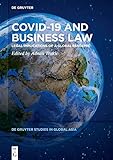Covid-19 and Business Law : Legal Implications of a Global Pandemic / ed. by Adnan Trakic.
Material type: TextSeries: De Gruyter Studies in Global Asia ; 3Publisher: Berlin ; Boston : De Gruyter, [2021]Copyright date: ©2021Description: 1 online resource (VIII, 187 p.)Content type:
TextSeries: De Gruyter Studies in Global Asia ; 3Publisher: Berlin ; Boston : De Gruyter, [2021]Copyright date: ©2021Description: 1 online resource (VIII, 187 p.)Content type: - 9783110723588
- 9783110723809
- 9783110723694
- COVID-19 (Disease) -- Law and legislation
- COVID-19 Pandemic, 2020- -- Social aspects
- Commercial law
- Human rights
- COVID-19
- Globale Pandemie
- Menschenrechte
- Rechtliche Implikationen
- Rechtsstaatlichkeit
- Wirtschaftsrecht
- BUSINESS & ECONOMICS / Business Law
- Shari’ah and Common Law, Harmonisation of Law, Comparative Law, Law in Asia, Law and Society
- 344.04/362414 23
- K3575.C68 C68 2021
- online - DeGruyter
- Issued also in print.
| Item type | Current library | Call number | URL | Status | Notes | Barcode | |
|---|---|---|---|---|---|---|---|
 eBook
eBook
|
Biblioteca "Angelicum" Pont. Univ. S.Tommaso d'Aquino Nuvola online | online - DeGruyter (Browse shelf(Opens below)) | Online access | Not for loan (Accesso limitato) | Accesso per gli utenti autorizzati / Access for authorized users | (dgr)9783110723694 |
Frontmatter -- Preface -- Contents -- 1 COVID-19 and Business Law: Challenges and Opportunities -- 2 The Impact of COVID-19 on Contractual Obligations in Malaysia -- 3 COVID-19 and Its Influence on Selected Employment Relationship Issues -- 4 Look What COVID-19 Unveiled: The Lack of Insolvency Protection by Malaysian Travel Companies -- 5 Implications of the COVID-19 Pandemic for the Malaysian Companies Act 2016 -- 6 COVID-19 Pandemic and Competition Law -- 7 Discussions on Human Rights and the Rule of Law in the COVID-19 Reality -- 8 COVID-19 and Trafficking of Migrant Workers for Forced Labour -- 9 The Importance of Legal Services During the COVID-19 Pandemic -- 10 COVID-19 and Business Law: Findings and Recommendations -- Notes on Contributors
restricted access online access with authorization star
http://purl.org/coar/access_right/c_16ec
Harmonisation of law, a term that refers to an effort to bring two different legal traditions in harmony with one another, has developed a rather negative connotation over time when mentioned in the context of Shari’ah and common law. Harmonisation began to be looked at as an attempt by one legal system to impose its values on the other. A major reason for that is the lack of understanding of the scope to which these two legal traditions converge. One of the principal findings of this book is that Shari’ah and common law have many more commonalities than differences. As a result, the need for harmonisation between the two might have been exaggerated. The similarities do not need to be harmonised. Rather, they need to be acknowledged and appreciated. If the differences between Shari’ah and common law, which undoubtedly exist as evidenced in this book, are approached from the position of appreciation for commonalities, the ambiance to reconcile the differences would be more conducive to the harmonisation process which would, in that case, be reflective of compromise. This book is intended to help readers better understand Shari’ah and common law and aid harmonization efforts when needed.
Issued also in print.
Mode of access: Internet via World Wide Web.
In English.
Description based on online resource; title from PDF title page (publisher's Web site, viewed 28. Feb 2023)


